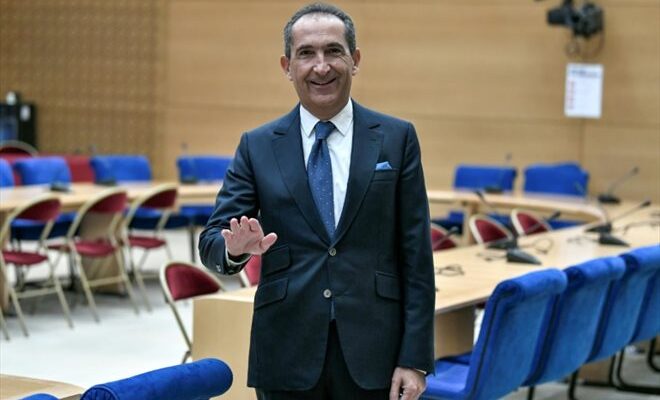In front of a closed store in London, May 16, 2023 (AFP / Adrian DENNIS)
The British telephone operators BT and Vodafone, hit by the inflation of their costs, announced two days apart tens of thousands of job cuts.
BT, which had already begun cutting costs amid a tough economy, said on Thursday it would cut up to 55,000 jobs by 2030.
It intends to rely by the end of the 2020s “on a much smaller workforce and considerably reduced costs”, said its managing director Philip Jansen in a press release.
Job cuts represent up to 42% of the 130,000 people employed by the group, directly or through intermediaries.
On Tuesday, rival Vodafone said it planned to cut 11,000 jobs over three years to boost its competitiveness in a context of underperformance and declining stock prices for several years.
Both Vodafone and BT have suffered from “inflationary pressures, particularly from energy prices”, notes Victoria Scholar, an analyst at Interactive Investor. The analyst notes in particular that BT is focusing on digitization and the integration of artificial intelligence, changes that will likely require fewer workers, according to her.
The vast workforce cuts planned by Vodafone and BT come against a backdrop of inflation at around 10% in the United Kingdom, the highest in the G7, in a country where the unemployment rate, although at levels historically low at 3.9%, has risen over the past two months.

The BT Sports app pictured on a smartphone in London on April 29, 2021 (AFP/Archives/Justin TALLIS)
BT saw its turnover decrease by 1% to 20.7 billion pounds for its financial year ended at the end of March, despite a 4% increase for its subsidiary Openreach, responsible for deploying fiber in the United Kingdom.
Its net profit rose sharply by 50%, but above all thanks to an exceptional tax credit linked in part to the sale of BT Sports, as part of a joint venture with Warner Bros. Discovery. Pre-tax profit fell 12% to 1.7 billion pounds.
– 3 billion in savings –
BT says its cost reduction plan, in place since April 2020, is on track “with gross savings of 2.1 billion pounds” approaching its 3 billion target.
The group also indicated during the year that it was merging its Business and International divisions into a single unit, BT Business, in order to generate cost synergies there too. He said he hoped to see his result recover for the current financial year but warned that the pressures of the cost of living and inflation will continue this year.
The job cuts “are intended to make the group’s operations more sustainable,” said Dan Ridsdale, analyst at Edison Group. According to him, “most investors will recognize the need” for the telecom industry “to achieve long-term savings”
But “the scale of the reduction” and the disruption it could cause raise concerns, he said.

Patrick Drahi, boss of the telecoms and media group Altice, before a hearing in the Senate, February 2, 2022 (AFP/Archives/STEPHANE DE SAKUTIN)
BT shares fell more than 7% in mid-session on the London Stock Exchange. In December, the group put an end to a movement of strikes in the United Kingdom by an agreement to raise wages with the unions.
But “we have made it clear to BT that we want to keep as many direct jobs as possible,” the sector union CWU reacted in a statement on Thursday. CWU believes that job cuts “should come primarily from subcontractors” but also from “natural” departures (such as retirements).
Patrick Drahi, boss of the telecoms and media group Altice, became the operator’s largest shareholder in June 2021 with 12.1% of the capital. He had increased his stake to 18% a few months later.
© 2023 AFP
Did you like this article ? Share it with your friends with the buttons below.




